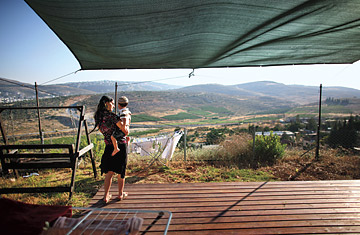
Jewish settler Einat a Bloch holds her neighbours son outside their home at the settlement of Shilo in the West Bank.
(2 of 3)
The Katz family moved to Efrat from Woodmere, N.Y., in 1985, after a family visit to Israel during which Sharon had an epiphany while her children played with some newly arrived Ethiopians. "I looked at my sons in their Izod shirts next to these children from Africa, and I saw black, white, black," she says. "The Bible talks about the ingathering of the exiles, and here were these children all together." The Katzes don't think their town is an obstacle to peace. They can sometimes see Palestinian Arabs on the green flats far below but have no interaction with them. Most people in Efrat take bulletproof buses to Jerusalem, 15 minutes away, via a "bypass road" — one of a vast network Israel has built in the West Bank. The Katzes believe Arabs arrived in the area only in the 1970s. "People tried to build here many times and failed because the conditions were very harsh, rocky, no water," Israel Katz explains. "Jews are very stubborn people. If they want something, they won't stop. Jews started coming here and to talk of a community. That's when Arabs started coming here."
The Netanyahu government, like its predecessors, makes a distinction between what it calls "legal" settlements like the Gush Etzion bloc (pop. 75,000) and "illegal" outposts deeper in the West Bank. Within sight of the Arab city of Nablus, settler Itay Zar, 33, lives in a two-room shanty with his wife and their five children, above a stretch of road at risk from Palestinian snipers. Zar's father, Moshe Zar, is one of the biggest — and therefore most despised by Palestinians — Jewish buyers of Arab land in the West Bank. Zar grew up in the West Bank. His outpost — named Havat Gilad after an elder brother killed by Palestinians — consists of a dozen shabby metal shacks and trailers inhabited by 20 families, with 40 to 50 children among them. A plastic slide and swing set stand on a weedy corner of the arid hilltop. Havat Gilad gets electricity from generators and water from a hilltop tank. The Israeli government evacuated the settlement five years ago but recently agreed to transport its children to school. "We are on a mission," Zar tells TIME. "We didn't come here for fun, although we have fun sometimes. When we came here, this land was deserted. Since the Jews came back, it has started to flourish."
To reinforce the spiritual mission, Zar erected a yeshiva that houses 35 young men. Their families pay about $250 a month for room, board and religious instruction centered on their role in God's plan to populate the occupied area with Jews. The settlement's spiritual leader, Arie Lipo, 35, sporting a 9-inch ginger beard and an ankle-length white gown, tells TIME he battled Israeli solders during the last evacuation, but he talks softly of a kind of peace. "We build small heavens here," he says. "We are the people of the Bible. If Obama fights what God has done in bringing the people of the Bible here from the four corners of the earth, he will fall. Now the question is, Who is the boss? God? Or Obama?"
In the absence of divine intervention, resolution of the settlement conflict will have to depend on human effort. Itay Zar and Sharon Katz are profoundly unlike each other, but Palestinians revile them equally. To the Arabs, Israeli settlements have sliced and diced up territory that once belonged to them, taking scarce resources like water and requiring special checkpoints that make their daily lives a misery. Down the hillside a few miles from the Katz home, Naim Sarras, 49, a Christian Palestinian farmer, vehemently disputes the claim that Arabs arrived only in the 1970s. He displays a long row of grapevines with thick trunks, and papers from the Ottoman era that he says prove his family has farmed the land for 150 years. He can no longer sell much of his produce because the Israeli government requires him to label it PRODUCT OF ISRAEL and the Palestinian Authority forbids that. But he can't afford to leave the fields fallow — and open to Israeli confiscation. Three Sarras brothers and a cousin tend the fields under the constant surveillance of video cameras at the edge of a nearby settlement. They complain that settlers from the Gush Etzion bloc have come in the night and uprooted or poisoned olive trees. "I am willing to live with Israelis," Sarras says. "But they will not live with us." Shaul Goldstein, mayor of the Gush Etzion regional council, defends his community's dealings with local Arabs. "We have the right to have cameras to protect our communities," says Goldstein, 49, a builder who constructed many of the Etzion homes. He insists he has Palestinian friends and says, "When I saw someone had uprooted trees, we condemned it very, very dramatically. I don't accept any kind of violence."
